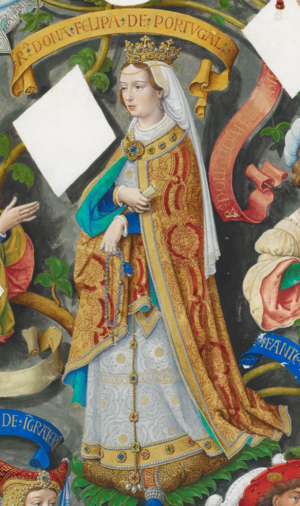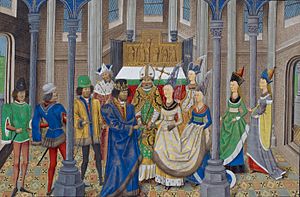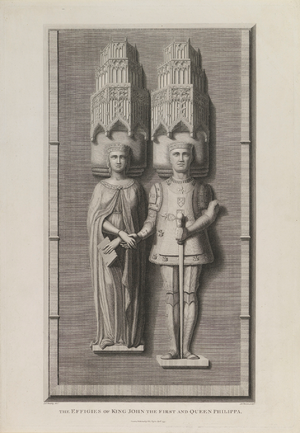Philippa of Lancaster facts for kids
Quick facts for kids Philippa of Lancaster |
|
|---|---|

Queen Philippa in Genealogia dos Reis de Portugal (António de Holanda; 1530–1534)
|
|
| Queen consort of Portugal | |
| Tenure | 14 February 1387 – 19 July 1415 |
| Born | 31 March 1360 Leicester Castle, Leicester, England |
| Died | 19 July 1415 (aged 55) Sacavém, Portugal |
| Burial | Batalha Monastery |
| Spouse | John I of Portugal |
| Issue among others... |
|
| House | Lancaster |
| Father | John of Gaunt, 1st Duke of Lancaster |
| Mother | Blanche of Lancaster |
| Religion | Catholicism |
| Signature |  |
Philippa of Lancaster (born March 31, 1360 – died July 19, 1415) was the Queen of Portugal from 1387 until 1415. She became queen by marrying King John I. Philippa was born into the royal family of England. Her marriage helped create the Treaty of Windsor, a long-lasting friendship between England and Portugal. She had many children who became famous in Portugal as the "Illustrious Generation".
Contents
Early Life and Education
Philippa was born on March 31, 1360. She was the oldest child of John of Gaunt, 1st Duke of Lancaster, and Blanche of Lancaster. As a baby, Philippa moved often with her family. She grew up and was educated with her younger siblings, Elizabeth and Henry. Henry later became King Henry IV of England.
Philippa's mother, Blanche, passed away in 1368. Her father remarried twice. His second wife was Infanta Constance of Castile. After Constance died, he married Katherine Swynford. Katherine had been Philippa's governess, a teacher and caregiver. This marriage was seen as unusual at the time. Philippa learned from this to always protect her own reputation.
Katherine Swynford was well-liked by Philippa and her siblings. She played a big part in Philippa's education. Katherine was also connected to the famous writer Geoffrey Chaucer. Chaucer spent a lot of time with the family and was one of Philippa's many teachers. Philippa was very well educated for a woman of her time. She studied science, poetry, philosophy, and religion. She read works by ancient Greek and Roman thinkers.
Becoming Queen of Portugal
Philippa became the Queen consort of Portugal when she married King John I. This marriage was an important step in the Anglo-Portuguese Alliance. This alliance brought England and Portugal together against France and Castile. The wedding ceremony took place in the Cathedral of Porto on February 2, 1387. The official marriage was on February 14, 1387. The Portuguese court celebrated this union for fifteen days.
Philippa married King John I by proxy. This means someone stood in for the king during the ceremony. The person who stood in for King John I was João Rodrigues de Sá. In a unique Portuguese tradition, the stand-in even pretended to share a bed with the bride.
For noble families in the Middle Ages, marriage was often about politics. Philippa and King John did not meet until twelve days after they were legally married. King John I already had children from a previous relationship. Philippa made sure these children were raised well at court. Their mother moved to a convent, becoming a leader there.
By marrying Philippa, King John I formed a strong alliance with her father, John of Gaunt. This alliance led to the Portuguese-English Alliance in 1386. This friendship lasted for a very long time, even through the Napoleonic Wars. It also helped Portugal stay neutral in World War II.
Philippa was 27 when she married. Some people thought she was too old to have children. However, Philippa had nine children, and six of them lived to adulthood.
Influence at Court
Philippa was known for being a very religious and proper queen. But she also had a lot of power and influence in both the Portuguese and English courts. She was very involved in important world events. Letters show that Philippa often wrote to the English court from Portugal. She stayed involved in English politics.
For example, Philippa helped followers of the dethroned King Richard II. They asked for her help after her brother, Henry IV, took the English throne. She also convinced the Earl of Arundel to marry her husband's daughter. This further strengthened the alliance between Portugal and England.
Philippa's most important political work was in her own court. After Portugal's wars with Castile and the Moors ended, the country's economy was struggling. Many soldiers were now without jobs. Philippa believed that taking control of Ceuta would make Portugal rich. This city would give Portugal control over the African and Indian spice trade. Philippa died before her plan happened. But Portugal did send an expedition to conquer Ceuta. They successfully took the city on August 14, 1415.
Death
At 55 years old, Philippa became sick with the plague. She moved from Lisbon to Sacavém. She called her sons to her side to give them her blessing. Philippa gave her three oldest sons swords decorated with jewels. These swords would be used when they became knights. She also gave each of them a piece of the True Cross. She told them to keep their faith and do their duties.
King John had grown very fond of his wife. It is said he was so sad about her illness that he could not eat or sleep. In her last hours, Philippa was clear-headed and felt no pain. A story says she was woken by a strong wind. She asked what wind it was. When told it was the north wind, she said it was good for her sons' and husband's trip to Africa. She had helped plan this trip. When she died, she prayed with priests. She passed away peacefully, with a smile on her face.
Children
Philippa was known as a kind and loving queen. She was the mother of the "Illustrious Generation" (in Portuguese, Ínclita Geração). Her children were:
- Blanche (born July 13, 1388 – died March 6, 1389), who died as a baby in Lisbon.
- Afonso (born July 30, 1390 – died December 22, 1400), who was the heir to the throne but died as a child.
- Edward (born October 31, 1391 – died September 13, 1438), a writer and thinker. He became King of Portugal in 1433.
- Peter (born December 9, 1392 – died May 20, 1449), Duke of Coimbra. He traveled widely and served as a leader for his nephew Afonso V.
- Henry (born March 4, 1394 – died November 13, 1460), known as "the Navigator." He helped Portugal begin the Age of Discovery.
- Isabella (born February 21, 1397 – died December 11, 1471), who married Philip III of Burgundy.
- Blanche (born April 11, 1398 – died July 27, 1398), who also died as a baby.
- John (born January 13, 1400 – died October 18, 1442), a military leader. He was the grandfather of two important kings in the 1500s.
- Ferdinand (born September 29, 1402 – died June 5, 1443), called "the Saint Prince." He was a warrior who was captured in 1437 and died as a prisoner.
Legacy
Philippa and King John's marriage was praised. It brought honesty and good values to a court that was seen as troubled. Philippa is remembered as the mother of "The Illustrious Generation." Her children who lived to adulthood made important contributions to history. Edward became the eleventh King of Portugal. He was known as "The Philosopher" or "the Eloquent." Henry the Navigator supported many voyages of exploration to Africa.
Philippa's influence was also written about in poems. The French poet Eustache Deschamps wrote a poem dedicated to "Phelippe en Lancastre." Some people also think that Geoffrey Chaucer may have mentioned Philippa in his poem, "The Legend of Good Women."
See also
 In Spanish: Felipa de Lancaster para niños
In Spanish: Felipa de Lancaster para niños
 | William Lucy |
 | Charles Hayes |
 | Cleveland Robinson |



